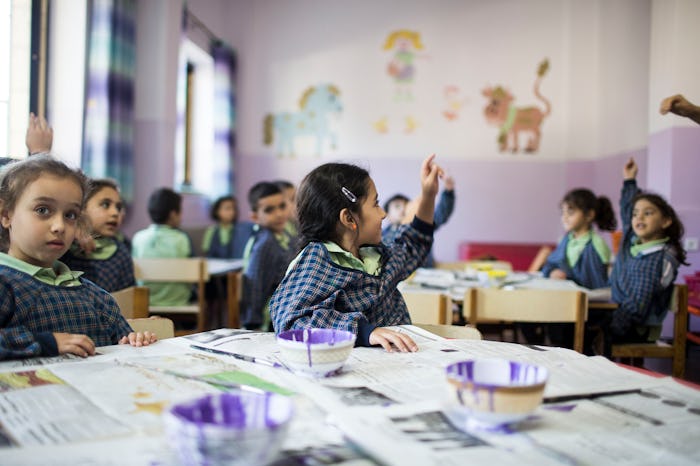Life

Kids With A Strong Early Education Are More Successful
In the wake of Betsy DeVos' appointment as the Secretary of Education, many parents in the U.S. are worried about how the controversial appointee will change the future of the American education system. Those who are parents of small children are particularly worried about the impact it will have on early childhood education programs, many of which rely on government funding. The results of a more than 40-year long study shows that losing those programs could have longterm effects on the wellbeing of children. Recently, a study found that kids with a strong early education get along better with their parents later in life, are more successful socially, and have greater economic success, so DeVos's decisions could impact that success directly.
Since the early 1970s, researchers in Chapel Hill, North Carolina, have been following a group of children to see how their early childhood education experiences influenced the rest of their lives. The original study was funded by the National Institutes of Health, which allowed the researchers to include 96 children in the study. Some of the children were randomly selected to serve as controls, and the others were placed in a high-quality early childhood education program beginning at six weeks of age and continuing until they were old enough to start kindergarten.
The Abecedarian Project, as the study is known, provided the children in the study with not just early childhood education but health care, nutrition, and social support for their families. Starting when the infants were six weeks old, they attended high-quality childcare programs five days a week, year-round, for the first five years of their lives. As the children grew up, the researchers charted their education, career, and relationship outcomes. While all the children in the study — regardless of whether they were in the control group or not— received the benefits like health care, it was the children who participated in the early childhood education programs that had the most success as adults, particularly in their social relationships.
The study found that, in addition to having more assets (like a home or a car) and career success, the adults who had been part of the early childhood education program got along better with their parents as adults. The researchers, including Craig Ramey — a professor and distinguished research scholar of human development at the Virginia Tech Carilion Research Institute— said that the results of the study kind of speak for themselves:
What we've discovered is that if you treat people well, they thrive and they, in turn, give back. Part of our task is to make what we now know to be so important - high-quality, early childhood education and care - widely available to all who need it in this country.
These early childhood education programs didn't just influence the children, but their entire families, too — all of whom were low-income. The children had access to health care and adequate nutrition, and since they were at the early childhood education program during the week, their parents were able to work without having to worry about childcare, according to The Washington Post. No doubt it was a combination of a reduction in those economic and social stressors for the parents, and the high quality education and personal attention the children received in the program, that lead to their happiness and success later in life.
The researchers will continue to analyze data and report, as they have for the last several decades. The infants who were included in the study are now heading into middle age, and researchers are looking forward to looking at how their experiences at work, as parents, and eventually even as grandparents could have been influenced by the opportunities they had in the first five years of life.